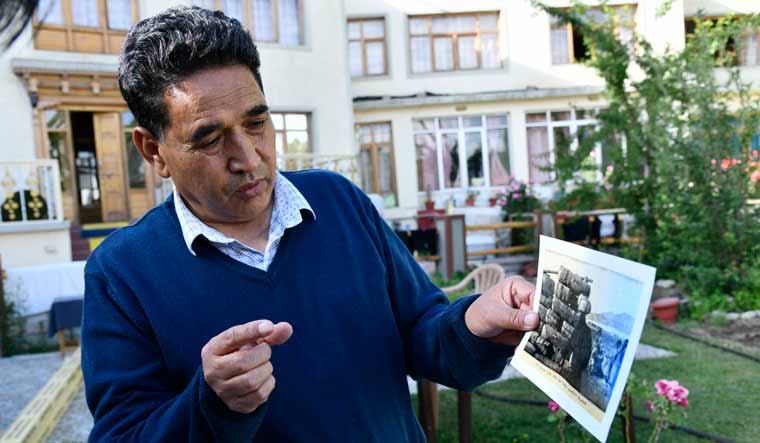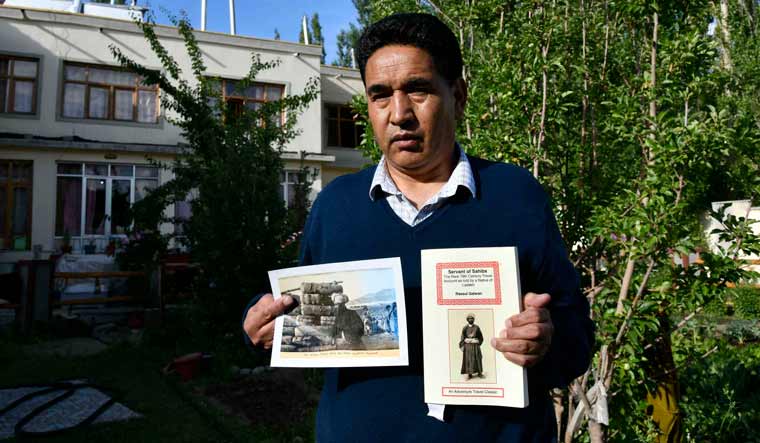Four days after the June 15 clash in the Galwan Valley region in eastern Ladakh, wherein 20 Indian soldiers were killed including a colonel, the Chinese Foreign Ministry stated that the valley is located on the "Chinese side" of the Line of Actual Control (LAC) in the western section of the Sino-Indian border.
The statement shocked 60-year old Ghulam Nabi Galwan, who runs a 20-room guest house in Leh, Ladakh, and for good reason—his grandfather was the man who discovered the valley way back in the 1890s. Official records claim that Rasool Galwan discovered the Galwan Valley and that it was named after him.
Talking to THE WEEK, Ghulam Nabi Galwan says that his grandfather discovered the Galwan Valley at the age of 14 in 1892, when he was leading a team of British mountaineers. He when travelling with Charles Murray, the seventh Earl of Dunmore, when the British were on an intelligence-gathering mission of Pamir Mountain Range.
"My grandfather, Ghulam Rasool Galwan, helped the British trekkers who lost their way in a valley. Eventually, my grandfather found out a new path from Galwan [valley] and helped Britishers. It was after this discovery that the British named this valley after my grandfather." Ghulam Nabi Galwan said, who himself could not get an opportunity to visit Galwan valley, which is nearly 200 kilometres from Leh.
 Ghulam Nabi Galwan runs a hotel in Leh | Sanjay Ahlawat/Leh,Ladakh
Ghulam Nabi Galwan runs a hotel in Leh | Sanjay Ahlawat/Leh,Ladakh
Born to a poor family in 1878, Galwan was passionate about mountaineering expeditions. In fact, his adventures in Galwan are recorded in a book written by him in broken English, titled Servant of Sahibs. British Army officer and explorer Francis Younghusband, who had taken Galwan on his expeditions in the valley, wrote the foreword and published the book.
Ghulam Nabi says that the book was an outcome of Galwan's tour diaries which he used to write during every expedition. “Later, Younghusband printed his diary in its original form at Cambridge in 1920," Nabi said.
Explaining more about his grandfather, Ghulam Nabi said that Galwan, due to his exposure to many travellers, managed to learn at least six languages, including Turkish, Chinese, Tibetan, Kashmiri, and bit of English as well.
"Whenever I read Chinese claims over Galwan Valley, I really get upset. Official gazettes prepared during the British Raj and local revenue records of Ladakh [show] Galwan valley has always been part of India. Chinese are lying and it is their way to grab lands as [part of] its policy of expansionism," Nabi told THE WEEK.
During Prime Minister Narendra Modi's visit to Leh last week, he had stated that the “age of expansionism” was over and countries across the world were now witnessing the era of development, without mentioning China name.
He felt sad when heard of the killing of 20 Indian troops in the Galwan Valley, the place, where his grandfather saved 20 lives during his expedition.
"India must give a strong reply to [the] Chinese. [The] Chinese have to vacate Galwan Valley, which is not their territory at all," Nabi added.



